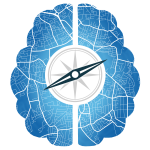Our Research Projects
In-Person Studies
Navigation Strategies and Aging
In this study, we want to understand the ways in which individuals make strategies when navigating and how that changes as we age. The study will take place in the Psychology building at the University of Florida and will consist of one 2-hour session where you will complete some tasks and questionnaires on a computer. Eligible participants must be 55 or older. Interested participants are encouraged to check out our Navigations Decisions study as well, as they may qualify!
Send an email to scannlab@psych.ufl.edu with the subject line Navigation Strategies and Aging to get started or call us at 352-294-9055.

Navigation Decisions
This study is interested in studying the ways in which people navigate. It involves navigating in a virtual environment on a desktop computer. Participants will undergo four, one-hour sessions at the Department of Psychology on UF campus. To participate in this study, participants will only be eligible if they are 55 and older. There may be additional eligibility requirements.
Send an email to scannlab@psych.ufl.edu with the subject line Navigation Decisions to get started or call us at 352-294-9055.

Memory and Spatial Navigation
The goal of this study is to understand how people learn spatial information in an environment. This study involves navigating in a virtual environment on a desktop PC and performing tasks based on the environment. The study is approximately three hours long and will be completed in-person on UF’s campus. Participants will be paid $20/hour for the time they participate in the study upon study completion. There may be additional eligibility requirements.
This study is not recruiting participants at this time.

Comprehending Spatial Direction
To successfully navigate in our environment, we need to efficiently extract and comprehend spatial direction from a variety of navigation cues, like street signs, maps, and written instructions. The goal of this project is to investigate how humans comprehend spatial direction and how this ability degrades in normal aging and age-associated neurodegenerative disease, like Alzheimer’s. The experiment lasts 3 hours and includes a 1.5-hour MRI scan on UF’s campus. You are eligible to participate if you (1) are between the ages of 18 and 35 OR 55 and older, (2) have no metal in your body, (3) are able to stay still for more than an hour, (4) have no history of brain injury or trauma, and (5) are not pregnant. There may be additional eligibility requirements. Volunteers will receive a $90 prepaid debit card for participating.
This study is not recruiting participants at this time.

Volumetric and Connectivity Measures of Navigation and Memory Skill Acquisition
The goal of this study is to understand the neural basis of spatial navigation and memory acquisition. Participants will either perform memory tasks on a computer, or navigate in a virtual environment for 10 two-hour sessions within a month long period. Additionally, participants will undergo two MRI scans within that month long period, thus needing to dedicate time within 12 days over a month long period. The study will be completed in-person on UF’s campus. Participants will be paid $20/hour for the time they participate in the study upon study completion. To participate in this study, participants will only be eligible if they are between the ages of 18 and 45. Additionally, participants who undergo an MRI scan must have no metal within their body and be able to stay still in the scanner for more than an hour. There may be additional eligibility requirements.
This study is not recruiting participants at this time.

Visual Attention and Spatial Navigation
Cues like street signs, maps, and written instructions help people navigate. But before these cues can be useful, people need to find them, a task requiring visual attention. The goal of this project is to understand how spatial navigation depends on our ability to attend to locations and objects in our visual field.
This study is not recruiting participants at this time.
